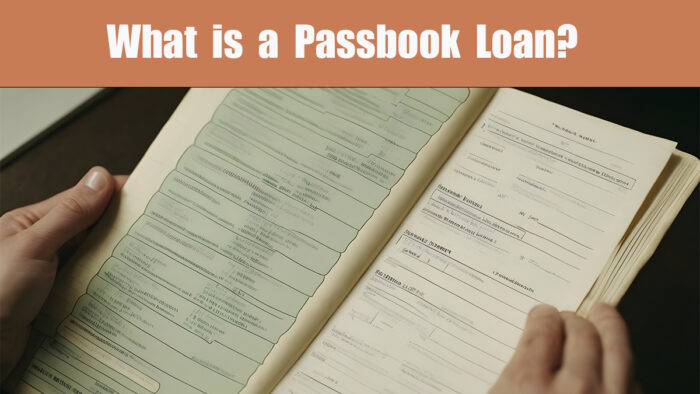A passbook loan offers loans with low interest rates without reducing your savings. If you are not eligible for other types of loans, then a passbook loan is the ideal option. This type of loan uses the funds in your savings account as collateral for the loan. To be eligible for this type of loan, you need to have a savings account with the financial institution you intend on borrowing from.

Furthermore, a passbook loan also offers the loan amount you need while building your credit score. If you are able to make timely payments for your loan, it will be reported to the credit bureaus, and this can build your credit score.
What is a Passbook Loan?
A passbook loan is a type of secured loan where a borrower uses their savings account balance as collateral to obtain a loan from a financial institution. The term “passbook” refers to the physical or electronic document that serves as proof of ownership and balance in the savings account.
Passbook loans are also known as certified pledge loans, and they are a convenient way to borrow money while you are building your credit score. Most lenders will allow you to borrow all or a part of your savings as collateral.
How Does a Passbook Loan Work?
A passbook loan makes use of the borrower’s savings account as collateral. To be qualified for a passbook loan, you need to have a savings account with enough funds and a certificate of deposit account. This type of account is typically with the financial institution you intend to borrow money from.
A passbook loan amount is determined by the balance in your savings account. The banks make use of your savings account balance as a guarantee for the loan. If you are unable to repay the loan, the money in your savings account will be deducted to repay the loan balance you owe.
Passbook loans are considered low-risk loans for the lender because there is collateral. The borrower must provide the passbook to the financial institution until the loan is fully paid back. For the passbook loan, the lender will place a hold on your savings account for the amount you borrowed.
During this time, you will not have access to the funds in your savings account. However, the locked savings funds will continue to gather interest at the standard annual percentage yield. As you repay the loan, the bank will release the same amount from the funds in your savings account. After fully repaying your loan, you will get full access to all the money in your savings account.
Advantages of Passbook Loans
Passbook loans offer several advantages for borrowers:
- Low Interest Rates: Passbook loans typically come with lower interest rates compared to other types of loans, such as personal loans or credit cards. Since the borrower’s savings account serves as collateral, lenders perceive passbook loans as low-risk, leading to more favorable interest rates.
- Accessible Funds: Borrowers can access funds quickly and easily through passbook loans without needing to undergo extensive credit checks or provide additional collateral. As long as they have a savings account with sufficient funds, they can obtain a passbook loan without hassle.
- Improved Credit Score: Successfully repaying a passbook loan can positively impact a borrower’s credit score. Timely payments demonstrate responsible financial behavior. It can help build or improve credit history. Thus making it easier to qualify for future loans or credit cards at favorable terms.
- Flexible Repayment Options: Passbook loans typically offer flexible repayment options, allowing borrowers to choose repayment terms that suit their financial situation. They may have the flexibility to make additional payments or pay off the loan early without incurring prepayment penalties.
- No Need for a Co-signer: Since passbook loans are secured by the borrower’s savings account, there’s no need for a co-signer or guarantor to qualify for the loan. This can be beneficial for borrowers who may not have someone willing or able to co-sign their loan.
Overall, passbook loans provide borrowers with a convenient and cost-effective way to access funds while leveraging their savings. However, it’s essential to carefully consider the terms and conditions of the loan and ensure that repayments are manageable to avoid defaulting on the loan.
Disadvantages of Passbook Loans
While passbook loans offer several benefits, they also come with some disadvantages:
- Risk of Losing Savings: Since the borrower’s savings account serves as collateral for the loan, there’s a risk of losing those savings if they fail to repay the loan according to the agreed-upon terms. If the borrower defaults on the loan, the lender can seize the funds in the savings account to recover the outstanding balance, potentially leaving the borrower without their savings.
- Limited Loan Amount: The amount that can be borrowed through a passbook loan is typically limited to a percentage of the balance in the savings account. This may restrict borrowers from accessing larger loan amounts compared to other types of loans, such as personal loans or home equity loans.
- Interest Rates: Although passbook loans generally offer lower interest rates compared to unsecured loans, they may still have higher rates than other secured loans, such as home equity loans or lines of credit. Borrowers with excellent credit may be able to qualify for lower rates with alternative loan options.
- Credit Impact: While successfully repaying a passbook loan can positively impact a borrower’s credit score, defaulting on the loan can have severe consequences. It can damage the borrower’s credit history and make it challenging to qualify for future loans or credit cards at favorable terms.
Borrowers should carefully weigh the advantages and disadvantages of passbook loans and consider alternative financing options based on their financial needs and circumstances. It’s essential to fully understand the terms and risks associated with passbook loans before proceeding with borrowing against savings.
Tips for Managing Passbook Loans
Managing passbook loans effectively involves careful planning and disciplined financial management. Here are some tips to help borrowers handle their passbook loans responsibly:
- Understand the terms: Thoroughly read and understand the terms and conditions of the passbook loan before agreeing to it. Pay close attention to the interest rate, repayment schedule, and any fees associated with the loan.
- Borrow wisely: Only borrow what you need and can afford to repay. Avoid borrowing more than necessary, as it could increase the risk of default and potentially lead to losing your savings.
- Regular Payments: Make timely payments according to the loan agreement. Missing payments can lead to penalties, increased interest charges, and damage to your credit score.
- Emergency Fund: While your savings are serving as collateral for the loan, it’s still important to have an emergency fund separate from your passbook savings account. This fund can help cover unexpected expenses and prevent the need for additional borrowing.
- Monitor Your Account: Keep track of your passbook savings account balance and loan payments regularly. Review statements and monitor for any discrepancies or unauthorized transactions.
- Avoid Overdrawing: Be mindful of your passbook savings account balance to avoid overdrawing. Overdrawing can result in fees and penalties, which could further strain your finances.
- Early Repayment: If possible, consider paying off the passbook loan early to reduce interest charges and free up your savings. However, check the loan agreement for any prepayment penalties before doing so.
- Communicate with the Lender: If you encounter financial difficulties or anticipate problems making payments, communicate with your lender promptly. They may offer assistance or alternative repayment options to help you avoid default.
By following these tips, borrowers can effectively manage their passbook loans while preserving their savings and financial stability.
Who Is Eligible for a Passbook Loan?
To be eligible for a passbook loan, you need to have a funded savings account or a certificate of deposit account. This account is typically with the financial institution you intend on borrowing from. The loan amount is determined by the balance in your savings account.
Should I Get a Passbook Loan?
If your other type of loan application has been denied due to your bad credit score, then you can opt for a passbook loan. With a passbook loan, you can borrow the amount you need while rebuilding your credit score. Each time that you make a timely payment for the loan, it will be reported to the credit bureaus.
Paying on time over the course of the loan will help you build your credit score. A passbook loan is also an ideal option. If you are not qualified for other types of loans, then you can opt for a passbook loan. This type of loan offers a low interest rate because you are using the balance in your savings account as collateral.



